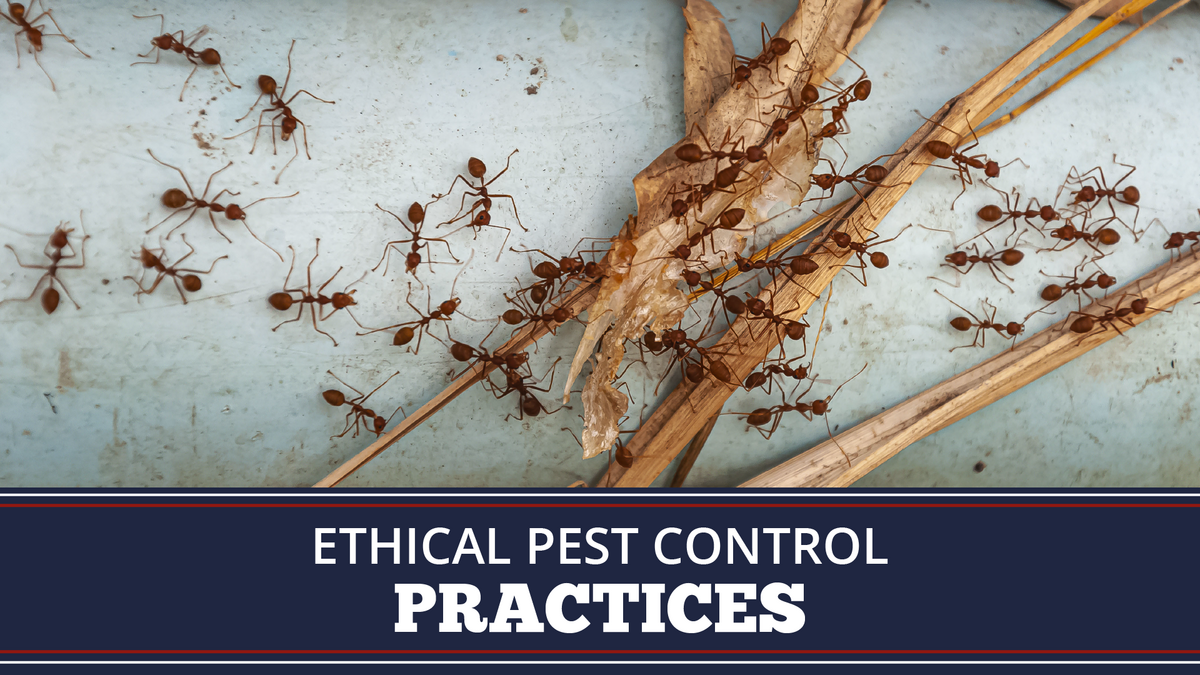Ethical Pest Control Practices

Imagine walking into your business property early in the morning, the first to arrive as the sun barely peeks over the horizon. As you switch on the lights, the quiet buzz of your workspace is shattered by the less welcome buzz and flutter of winged insects darting away from the sudden brightness.
Or perhaps, as you prepare to open a storage closet, you're greeted not by the supplies you need but by a trail of ants marching determinedly across the floor, seeking the tiniest crumbs left behind from yesterday’s activity.
Discovering a pest infestation in your business building or property can be unsettling and disruptive.
The initial shock of discovering these pests can prompt a hasty search for solutions. But the challenge lies not just in eradication but in doing so ethically and responsibly, ensuring that the methods employed safeguard both your property and the broader environment.
At Faith Environmental Crime Scene Clean Up, we understand the importance of addressing these issues swiftly, but equally essential is how they are handled.
In this article, we will explore why ethical pest control is vital for maintaining both the integrity of your property and the safety of its occupants. In addition, we will explain effective techniques that ensure both the efficacy of pest eradication and the protection of our ecosystem responsibly.
The Importance of Ethical Pest Control
Ethical pest control refers to the use of environmentally friendly methods to manage and eradicate pest infestations while minimizing harm to humans, animals, and the environment. The significance of upholding ethical pest control tactics cannot be overstated.
Here are three reasons why you should uphold ethical pest control tactics:
- Ethical pest control tactics prioritize the safety and well-being of humans. By using less toxic and potentially harmful methods of pest control, such as integrated pest management (IPM), ethical practices minimize the risk of adverse health effects on individuals, particularly those who are most vulnerable, such as children, pregnant women, and those with compromised immune systems. This ensures that pest control efforts do not cause more harm than the pests themselves.
- Environmental sustainability is prioritized with ethical pest control practices. Traditional chemical-based pest control methods can have detrimental effects on ecosystems, killing beneficial organisms and disrupting the ecological balance. In contrast, ethical approaches consider the long-term impact on the environment, promoting the use of non-chemical alternatives whenever possible. This not only protects biodiversity but also contributes to maintaining a healthy ecosystem.
- Responsibility towards all living beings is demonstrated. Treating pest problems with compassion and respect for the creatures involved is essential. Utilizing humane practices that minimize pain and suffering, such as trapping and relocating pests, rather than exterminating them, reflects a compassionate approach that respects the intrinsic value of all life.
Techniques Used in Ethical Pest Control
There are many techniques that you can employ to uphold ethical pest control.
At Faith Environmental Crime Scene Clean Up, we follow these six techniques to uphold ethical pest control practices.
By incorporating these ethical pest control techniques, it is possible to effectively manage pests while minimizing the negative impacts on the environment and promoting a sustainable approach to pest control.
- Biological control: This technique involves the use of natural enemies, such as beneficial insects, parasites, or predators, to control pest populations. For example, ladybugs can be introduced to control aphids, or nematodes can be utilized to combat soil-borne pests.
- Integrated Pest Management (IPM): IPM is an approach that combines various methods to control pests effectively. It integrates biological, cultural, and chemical control methods to manage pests in a sustainable manner. This technique focuses on prevention through habitat modification, monitoring, and only utilizing pesticides as a last resort.
- Habitat manipulation: Modifying the environment to deter pests is an essential technique in ethical pest control. For instance, using physical barriers like nets or fences can prevent pests from accessing crops or structures. Proper waste management and removing potential pest habitats can also discourage infestations.
- Pheromone traps: Pheromones are chemicals released by insects to communicate with each other. Using synthetic pheromones in traps can attract specific pests, reducing their numbers without harming other organisms. This method is highly targeted and reduces the need for harmful pesticides.
- Mechanical control: Physical methods, such as trapping, vacuuming, or hand-picking, can be employed to remove pests. This technique is often labor-intensive but can effectively manage certain pest populations, especially in smaller infestations.
- Natural repellents: Utilizing natural substances that repel pests, such as neem oil, vinegar, or essential oils, can help deter them from entering or infesting an area. These repellents are less harmful to the environment and provide a safer alternative to chemical pesticides.
Crime Scene Clean Up Will Ethically Take Care of Your Pests
At Crime Scene Clean Up, we understand the importance of ethical pest control and take pride in providing effective and responsible solutions. We are committed to implementing safe and humane methods to address pests, ensuring the well-being of you, your workers, and the environment.
Our team of highly trained professionals utilizes proven techniques to safely remove and control pests. We prioritize the use of environmentally friendly products that are effective.
We believe in addressing the root cause of pest infestations rather than just treating the symptoms. Our experts assess the unique circumstances of each situation, identify potential entry points, and recommend long-term prevention measures.
When it comes to pest control, trust Crime Scene Clean Up to ethically take care of your pests. Our dedicated team will provide professional services that effectively eliminate pests while minimizing the impact on the environment and your personal well-being.
Contact us today for a consultation and let us help you create a pest-free environment you can feel good about.
Click here to reach out to Faith Environmental Crime Scene Cleanup now!

